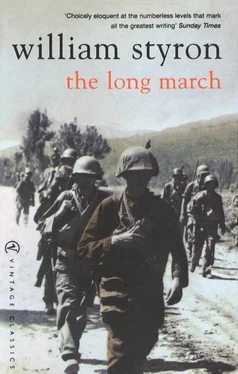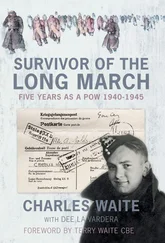William Styron - The Long March
Здесь есть возможность читать онлайн «William Styron - The Long March» весь текст электронной книги совершенно бесплатно (целиком полную версию без сокращений). В некоторых случаях можно слушать аудио, скачать через торрент в формате fb2 и присутствует краткое содержание. Город: New York, Год выпуска: 1952, ISBN: 1952, Издательство: Vintage Classics, Жанр: prose_military, на английском языке. Описание произведения, (предисловие) а так же отзывы посетителей доступны на портале библиотеки ЛибКат.
- Название:The Long March
- Автор:
- Издательство:Vintage Classics
- Жанр:
- Год:1952
- Город:New York
- ISBN:978-0099422792
- Рейтинг книги:3 / 5. Голосов: 1
-
Избранное:Добавить в избранное
- Отзывы:
-
Ваша оценка:
- 60
- 1
- 2
- 3
- 4
- 5
The Long March: краткое содержание, описание и аннотация
Предлагаем к чтению аннотацию, описание, краткое содержание или предисловие (зависит от того, что написал сам автор книги «The Long March»). Если вы не нашли необходимую информацию о книге — напишите в комментариях, мы постараемся отыскать её.
The Long March — читать онлайн бесплатно полную книгу (весь текст) целиком
Ниже представлен текст книги, разбитый по страницам. Система сохранения места последней прочитанной страницы, позволяет с удобством читать онлайн бесплатно книгу «The Long March», без необходимости каждый раз заново искать на чём Вы остановились. Поставьте закладку, и сможете в любой момент перейти на страницу, на которой закончили чтение.
Интервал:
Закладка:
Mannix watched him, too, watched the Colonel toe at the sand, thumbs hooked rak-ishly in his belt, a thin gentle smile on his face, adumbrated by the fading light: he looked youthful and fresh, nonchalant, displaying the studied casualness of an athlete before the stadium throng, confident of his own victory long before the race begins. Mannix gnawed at the end of a cigar, spat it out viciously. “Look at the little jerk. He thinks he’s gonna have us pooped out at the halfway mark—”
Culver put in, “Look Al, why don’t you do something about that nail? If you told the Colonel he’d let you ride in—”
Mannix went fiercely on, in a husky whisper: “Well he’s not. He’s a little sadist, but he’s not gonna have Al Mannix crapped out. I’ll walk anywhere that son of a bitch goes and a mile further. He thinks H & S Company’s been doping off. Well, I’ll show him. I wouldn’t ask him to ride in if I’d been walking over broken glass. I’ll—”
He paused. Culver turned and looked at him. They were both silent, staring at each other, embarrassed by the common understanding of their gaze. Each turned away; Mannix murmured something and began to tie his shoe. “You’re right, Al,” Culver heard himself saying. It seemed it was almost more than he could bear. Night was coming on. As in a stupor, he looked down the road at the battalion, the men lounging along the embankments with their rifles, smoking and talking in tired, subdued voices, smoke rising in giant blue clouds through the dusk, where swarms of gnats rose and fell in vivacious, panicky flight. In the swamp, frogs had begun a brainless chorale; their noise seemed perfectly suited to his sense of complete and final frustration. It was almost more than he could bear. So Mannix had felt it, too: not simply fear of suffering, nor exhaustion, nor the lingering horror, which gripped both of them, of that bloody wasteland in the noonday heat. But the other: the old atavism that clutched them, the voice that commanded, once again, you will. How stupid to think they had ever made their own philosophy; it was as puny as a house of straw, and at this moment—by the noise in their brains of those words, you will —it was being blasted to the winds like dust. They were as helpless as children. Another war, and years beyond reckoning, had violated their minds irrevocably. For six years they had slept a cataleptic sleep, dreaming blissfully of peace, awakened in horror to find that, after all, they were only marines, responding anew to the old commands. They were marines. Even if they were old. Bank clerks and salesmen and lawyers. Even if, right now, they were unutterably tired. They could no more not be determined to walk the thirty-six miles than they could, in the blink of an eye, turn themselves into beautiful nymphs. Culver was afraid he wasn’t going to make it, and now he knew Mannix was afraid, and he didn’t know what to feel—resentment or disgust—over the fact that his fear was mingled with a faint, fugitive pride.
Mannix looked up from his shoe and at the Colonel. “You’re goddam right, Jack, we’re going to make it,” he said. “My company’s going to make it if I have to drag in their bodies.” There was a tone in his voice that Culver had never heard before.
Suddenly the Colonel’s flat voice broke through the stillness: “All right, Billy, let’s saddle up.”
“’Tallion saddle up!” The Major’s words were eager and shrill, became multiplied down the long mile. “Smoking lamp’s out!” The blue cloud dissolved on the air, the gnats descended in a swarm and the voices passed on— Saddle up, saddle up —while the battalion rose to its feet, not all at once but in a steady gradual surge, like rows of corn snapping back erect after the passing of a wind. Mannix got to his feet, began to sideslip in a cloud of dust down the embankment toward his company directly below. It was at the head of the column, right behind the command group. Culver, moving himself now down the hill, heard Mannix’s shout. It rang out in the dusk with deliberate authority, hoarse blunt command: “All right, H & S Company, saddle up, saddle up! You people get off your asses and straighten up!” Culver passed by him on his way to the command group: he stood surrounded by a cloud of gnats, hulking enormously above the company, hands balanced lightly on his hips, poised forward badgering the men like some obsessed, rakehell Civil War general before a battle: “All right, you people, we’re gonna walk thirty-six miles tonight and I mean walk! First man I see drop out’s gonna get police duty for two weeks, and that goes for everybody. You think I’m kidding you wait and see. There’s gonna be trucks going in for those that can’t make it but I don’t want to see anyone from H & S Company climbing on! If an old man with as much flab as I’ve got can make it you people can too…” There was a note, almost, of desperation in his voice. Culver, passing along the line of bedraggled, mournful-looking men, so few of whom looked like fabled marines, heard the voice rise to a taut pitch close to frenzy; it was too loud, it worried Culver, and he wished to caution him: no longer just admonishing the men to a simple duty, it was the voice of a man wildly fanatic with one idea: to last. “I want to hear no bitching out of you people! Take it easy on the water. You get shinsplints or blisters you see the corps-man, don’t come crying to me. When we get in I want to see all of you people…” Not because the hike was good or even sensible, Culver thought, but out of hope of triumph, like a chain-gang convict who endures a flogging without the slightest whimper, only to spite the flogger. Culver joined the command group, heard the Colonel say to the Major: “Looks like H & S Company’s going to make it en masse, Billy.” It was just as Culver feared, for although his words were pleasant enough, his face, regarding Mannix for a brief moment, had a look of narrow scrutiny, as if he, too, had detected in the Captain’s tone that note of proud and willful submission, rebellion in reverse. But there was no emotion in his voice as he turned quickly, with a glance at his watch, and said, “Let’s move out, Billy.”
They started out without delay. A jeep, its headlamps lit, preceded them. The Colonel, in the lead, abreast of the Major and just ahead of Culver, plunged off into the deep dust of the road. He walked with a slinky-hipped, athletic stride, head down between his shoulders and slightly forward, arms bent and moving methodically; nothing broke the rhythm of his steps—ruts in the road or the deeply grooved tire tracks—and Culver became quickly amazed, and rather appalled, at the pace he was setting. It was the pace of a trained hiker—determined, unhesitant, much closer to a trot now than a walk—and only a few minutes passed before Culver was gasping for breath. Sand lay thick in the road, hindering a natural step. They had not gone more than a couple of hundred yards; already he felt sweat trickling down his forehead and beneath his arms. For a moment fear surged up in him unnaturally, and a crazy panic. He had been afraid of the march before, but his fear had been abstract and hazy; now so quickly fatigued, in what seemed a matter of seconds, he felt surely (as Mannix had predicted) that he’d be unable to last the first hour. A panicky wash of blood came to his face and he struggled for breath, wanting to cry out—it passed. His mind groped for reason and the terror receded: once he adjusted to the shock of this pace, he realized, he’d be all right. Then the panic went away; as it did so, he found himself breathing easier, freed of that irrational fright. The Colonel pushed ahead in front of him with the absolute mechanical confidence of a wound-up, strutting tin soldier on a table top. Culver, panting a bit, heard his voice, as calm and unwinded as if he were sitting at a desk somewhere, addressed to the Major: “We shoved off at nine on the dot, Billy. We should make the main road at ten and have a break.”
Читать дальшеИнтервал:
Закладка:
Похожие книги на «The Long March»
Представляем Вашему вниманию похожие книги на «The Long March» списком для выбора. Мы отобрали схожую по названию и смыслу литературу в надежде предоставить читателям больше вариантов отыскать новые, интересные, ещё непрочитанные произведения.
Обсуждение, отзывы о книге «The Long March» и просто собственные мнения читателей. Оставьте ваши комментарии, напишите, что Вы думаете о произведении, его смысле или главных героях. Укажите что конкретно понравилось, а что нет, и почему Вы так считаете.






![Джеффри Арчер - The Short, the Long and the Tall [С иллюстрациями]](/books/388600/dzheffri-archer-the-short-the-long-and-the-tall-s-thumb.webp)





